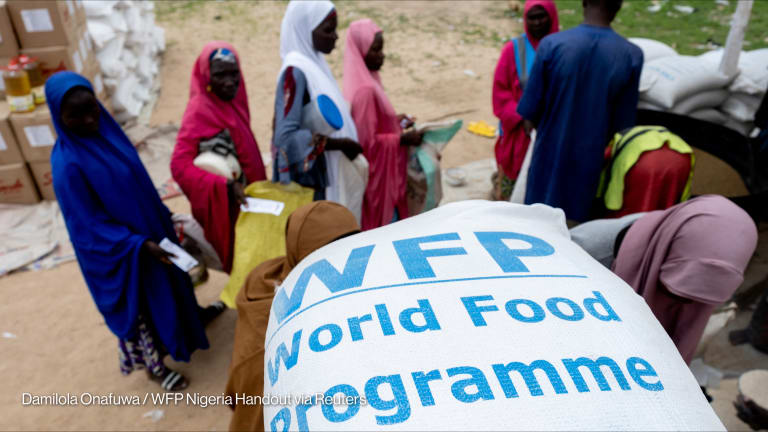
As rates of hunger soar around the world, the answer to the world’s food crises may be found growing in the ocean.
Vincent Doumeizel, a senior adviser on oceans to the United Nations Global Compact and passionate proponent of the “seaweed revolution” — a global movement to sustainably scale up seaweed production — called the plants “the greatest untapped resource we have on the planet.”
Growing more seaweed can help solve many of the world’s problems — whether agricultural, economic, or climatic — said Doumeizel, who also directs the food program at the Lloyd’s Register Foundation, a U.K.-based charity.
Get the inside track on how agriculture, nutrition, sustainability, and more are intersecting to remake the global food system in this weekly newsletter.
“The food systems that we have today are some of the biggest contributors to climate change, to water scarcity, to soil depletion, to modern slavery,” Doumeizel said in an interview with Devex. “We have no capacity left. We have reached capacity. And there’s an ecological emergency, and we have to feed [hungry people].”
In addition to increasing food supply, it’s possible to boost seaweed production while avoiding the overuse mistakes of traditional land agriculture, all while helping take carbon out of the atmosphere, according to a coalition of seaweed proponents who are advocating for concrete global policy and regulation of the industry. It also provides an economic growth opportunity for members of coastal communities, particularly women, who can benefit from farming a product that has many sustainable uses in addition to food.
Doumeizel said the fact that the ocean covers 70% of the planet demonstrates the tremendous opportunity for seaweed.
“The ocean can feed the world,” he said.
There are three types of seaweed — red, green, and brown — and over 10,000 species. More than 99% of global seaweed culture production takes place in Asia, where it is a staple in the diet. Doumeizel said he is baffled that it has taken so long to get the rest of the world’s attention on seaweed’s potential.
It did catch the eye of Jeff Bezos, whose Bezos Earth Fund granted $100 million to the World Wildlife Fund in 2020, with a portion intended for scaling up sustainable seaweed farming.
Although the Food and Agriculture Organization says the industry doubled in size between 2005 and 2015, it is still considered nascent. Seaweed is found in perhaps its most recognizable edible form in nori, the wrapping for sushi, but can also appear in ice cream as a thickening agent, among other foods. Household products such as toothpaste and lotion can include seaweed as well.
But Doumeizel and other experts say the potential uses go far beyond these.
“Seaweed is not only a source of food. … It’s a source to replace plastic. It’s a way to replace cotton or fibers and sustainable fibers. It’s an untapped innovation for medicines. There’s so much we can do. It is repairing the ocean, restoring biodiversity. It is sequestering more carbon than anything on land,” Doumeizel said.
“It is also a source of revenues and jobs for coastal communities where fishing is declining and where people are really poor. And more importantly, most of the time it’s a source of revenue for women,” he continued.
Doumeizel and his colleagues at the Lloyd’s Register Foundation outlined the business case for seaweed in a brief “Seaweed Manifesto” released in 2020, which describes opportunities for the industry’s growth, as well as potential hurdles to expanding production. It also shows the connection between seaweed production and a range of the U.N. Sustainable Development Goals, from ending hunger and reducing inequalities to taking action on climate change.
Its stated vision is for an “upscaled, responsible and restorative seaweed industry playing a significant role in achieving the Global Goals by contributing to food safety and security, climate change mitigation, poverty alleviation and support to marine ecosystems.”
Women in Kenya reap ecological and economic rewards from seaweed
Women in Kenya's coastal villages are seeing ecological and economic benefits from seaweed farming, with the hope of creating value addition by marketing seaweed products in the future.
The COVID-19 pandemic helped Doumeizel gain traction for seaweed’s potential, he said, because “everyone was stuck at home with nothing to do.” He has also helped launch the Safe Seaweed Coalition to promote consumer, environmental, and operational safety in the industry. The coalition now has over 600 member organizations.
Doumeizel said the coalition wants to avoid the mistakes of agricultural production on land, citing monoculture practices and the use of genetically modified organisms as examples. He said he’s not aware of any documented adverse impacts on the environment from seaweed farming.
An important aspect of the coalition’s work is to “make sure that what we are supporting is really also supported by the scientific evidence,” according to Nichola Dyer, the group’s senior adviser for partnerships, communications, and engagement. Dyer said she had trouble getting traction for seaweed in her prior post with the World Bank’s food and agriculture global practice.
“I was really frustrated about the disconnect between the terrestrial and the marine. … The food system should be viewed holistically,” Dyer said, adding that a scale-up of seaweed farming — if done strategically — can avoid the damage that traditional agriculture has done to the planet. “Seaweed starts with advantages because it doesn’t need fertilizer. It doesn’t need inputs. It needs what’s already there in the water.”
A lack of regulation in the industry is hampering its growth, as are conflicts among the rules that do exist, Dyer said. The coalition is working with FAO to update the Codex Alimentarius — a collection of international food standards — so that they include seaweed.
While FAO’s mandate doesn’t currently cover seaweed explicitly, that may change this year, said Alessandro Lovatelli, an aquaculture officer with FAO’s fisheries and aquaculture division. Every two years, the organization’s Committee on Fisheries, or COFI, meets to discuss its work related to fisheries and aquaculture. For the first time, COFI’s aquaculture subcommittee is set to consider a working paper on seaweed when it meets in September. If this is endorsed by member countries, FAO will then have a mandate to work on seaweed.
“[In the past] we had a lot of projects in the field — production, technology development, processing, trade, etc. — but it would be the first time we would have a clear mandate to do something at the global level,” said Lovatelli, who is on the steering committee for the Safe Seaweed Coalition. “It would be much easier for us to engage ourselves and engage interested parties in seaweed farming globally.”
“The ocean can feed the world.”
— Vincent Doumeizel, senior adviser on oceans, United Nations Global CompactFAO has supported seaweed projects in at least 14 different countries, Lovatelli said. The Seaweed Manifesto has increased the momentum around seaweed as something that “has huge potential” to improve global nutrition, he said, and meet the needs of a growing population while also providing economic growth to coastal communities.
“Let’s try to develop a value-added product where you can make a better living and better income,” Lovatelli said. “But of course, it’s easier to work in a country where people are used to eating seaweed and marine products in general … than trying to develop a product and introduce it into a country that has no familiarity.”
As seaweed grows as an industry, it will be important to manage challenges, such as ensuring smallholders have land and water tenure rights, along with mediating potential conflicts between seaweed farmers and fisherfolk, Dyer said.
“It is incredibly versatile. I’m still discovering all the wonders of seaweed. There’s so much out there that it can do,” Dyer said. “The potential is limited only by our own imaginations. And if we do it right, seaweed can be such an important part of the solution.”

Search for articles
Most Read
- 1
- 2
- 3
- 4
- 5








